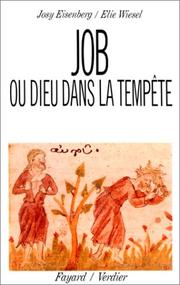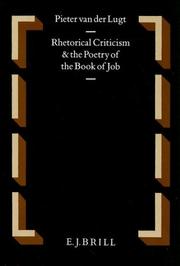| Listing 1 - 5 of 5 |
Sort by
|
Book
ISBN: 2246351111 9782246351115 Year: 1985 Publisher: Paris Grasset
Abstract | Keywords | Export | Availability | Bookmark
 Loading...
Loading...Choose an application
- Reference Manager
- EndNote
- RefWorks (Direct export to RefWorks)
Job est le véritable bouc émissaire de la société à laquelle il appartient et qui voit en lui un homme pervers à éliminer. Il permet ainsi à René Girard d'affiner le schéma qui était au coeur de ses livres précédents, mais il fonctionne aussi et surtout comme un modèle pour comprendre notre modernité dans ce qu'elle a de plus horrible : le totalitarisme. Pour la première fois en effet, René Girard s'attaque au monde contemporain, et démonte le mécanisme du procès totalitaire en insistant sur ce qui lui est essentiel et nécessaire : l'aveu de la victime. Pourquoi faut-il que l'accusé confesse une culpabilité dont tout le monde sait qu'elle est fausse ? Ces parodies judiciaires, qui vont de pair avec le culte de la personnalité, suggèrent une rechute dans des formes de socialité mensongères et violentes. C'est tout un ensemble primitif qui reparaît dans le totalitarisme moderne, plus dangereux encore.
Philosophy and psychology of culture --- Ethnology. Cultural anthropology --- Bible. --- Criticism, interpretation, etc --- Job --- Criticism, interpretation, etc. --- #GOSA:I.OT.Job.M --- #GOSA:V.A.M --- #gsdb3 --- #GGSB: Filosofie --- Job (Biblical figure) --- Ayyūb --- Eyyüb --- Giobbe --- Hiob --- Ijob --- Iyov --- Job, --- Nabi Ajub --- איוב --- איוב (דמות מקראית) --- Ayyūb (Book of the Old Testament) --- Giobbe (Book of the Old Testament) --- Hiob (Book of the Old Testament) --- Ijob (Book of the Old Testament) --- Iobus (Book of the Old Testament) --- Iov (Book of the Old Testament) --- Iyov (Book of the Old Testament) --- Iyyov (Book of the Old Testament) --- Job (Book of the Old Testament) --- Jobus (Book of the Old Testament) --- Livro de Jó --- Yop-ki (Book of the Old Testament) --- Cultuurfilosofie. Cultuurpsychologie --- Volkenkunde. Culturele antropologie --- Filosofie --- Job - (Biblical figure) --- Bouc émissaire. --- Totalitarisme.

ISBN: 221301843X 9782213018430 Year: 1986 Publisher: Paris Fayard-Verdier
Abstract | Keywords | Export | Availability | Bookmark
 Loading...
Loading...Choose an application
- Reference Manager
- EndNote
- RefWorks (Direct export to RefWorks)
Job --- Bible. --- Criticism, interpretation, etc --- Criticism, interpretation, etc. --- Bible --- 223.2 --- #GGSB: Exegese O.T. --- #GGSB: Tekstkritiek O.T. --- #GGSB: Wijsheidsliteratuur --- Job. Hiob --- Job (Biblical figure) --- Job, --- #GGSB: Exegese O.T --- #GGSB: Tekstkritiek O.T --- Ayyūb --- Eyyüb --- Giobbe --- Hiob --- Ijob --- Iyov --- Nabi Ajub --- איוב --- איוב (דמות מקראית) --- Ayyūb (Book of the Old Testament) --- Giobbe (Book of the Old Testament) --- Hiob (Book of the Old Testament) --- Ijob (Book of the Old Testament) --- Iobus (Book of the Old Testament) --- Iov (Book of the Old Testament) --- Iyov (Book of the Old Testament) --- Iyyov (Book of the Old Testament) --- Job (Book of the Old Testament) --- Jobus (Book of the Old Testament) --- Livro de Jó --- Yop-ki (Book of the Old Testament) --- Personnages bibliques --- Bible OT. Wisdom books. Job --- Exegese O.T --- Tekstkritiek O.T --- Wijsheidsliteratuur --- Job - (Biblical figure)
Book
ISBN: 0664218318 9780664218317 Year: 1985 Publisher: Philadelphia (Pa.) Westminster press
Abstract | Keywords | Export | Availability | Bookmark
 Loading...
Loading...Choose an application
- Reference Manager
- EndNote
- RefWorks (Direct export to RefWorks)
223.2 --- Job. Hiob --- Bible. --- Ayyūb (Book of the Old Testament) --- Giobbe (Book of the Old Testament) --- Hiob (Book of the Old Testament) --- Ijob (Book of the Old Testament) --- Iobus (Book of the Old Testament) --- Iov (Book of the Old Testament) --- Iyov (Book of the Old Testament) --- Iyyov (Book of the Old Testament) --- Job (Book of the Old Testament) --- Jobus (Book of the Old Testament) --- Livro de Jó --- Yop-ki (Book of the Old Testament) --- Commentaries.
Book
Abstract | Keywords | Export | Availability | Bookmark
 Loading...
Loading...Choose an application
- Reference Manager
- EndNote
- RefWorks (Direct export to RefWorks)
223.2 --- #GBIB:SMM --- #gsdb1 --- #GGSB: Geestelijke lezing(rood) --- #GGSB: Bijbel --- #GGSB: Tekstkritiek O.T. --- #GROL:SEMI-223.2 --- tekstuitgave --- Oud Testament --- Job. Hiob --- #GGSB: Tekstkritiek O.T --- Bible. --- Ayyūb (Book of the Old Testament) --- Giobbe (Book of the Old Testament) --- Hiob (Book of the Old Testament) --- Ijob (Book of the Old Testament) --- Iobus (Book of the Old Testament) --- Iov (Book of the Old Testament) --- Iyov (Book of the Old Testament) --- Iyyov (Book of the Old Testament) --- Job (Book of the Old Testament) --- Jobus (Book of the Old Testament) --- Livro de Jó --- Yop-ki (Book of the Old Testament) --- Criticism, interpretation, etc. --- Bijbel --- Geestelijke lezing(rood) --- Tekstkritiek O.T

ISSN: 01697226 ISBN: 9004103260 9004493530 9789004103269 9789004493537 Year: 1995 Volume: 32 Publisher: Leiden Brill
Abstract | Keywords | Export | Availability | Bookmark
 Loading...
Loading...Choose an application
- Reference Manager
- EndNote
- RefWorks (Direct export to RefWorks)
Rhetorical Criticism and the Poetry of the Book of Job deals with the structure and meaning of the poems we find in Job 3-42,6. It is demonstrated that these poems exhibit a consistent pattern of cantos and strophes. The recurring structures often place the various thematic aspects of the texts in a different light. The analysis of the poems relates their rhetorical framework to the device of distant repetitive parallelism. These verbal repetitions appear to display distinct patterns and help to discover recurring and leading ideas. The final section offers a new theory on the demarcation of the (three) speech-cycles which give structure to chs. 4-31 and 38-41. This theory is of special importance for the interpretation of chs. 24-28. The work is of interest for all who study the forms and meaning of classical Hebrew poetry.
Bible--Rhetoric --- Bible--Rhétorique --- Bijbel--Retorica --- Bijbelse retorica --- Retorica in de Bijbel --- Rhetoric in the Bible --- Rhétorique dans la Bible --- Rhetoric in the Bible. --- Bible. --- Criticism, interpretation, etc. --- 223.2 --- Job. Hiob --- Ayyūb (Book of the Old Testament) --- Giobbe (Book of the Old Testament) --- Hiob (Book of the Old Testament) --- Ijob (Book of the Old Testament) --- Iobus (Book of the Old Testament) --- Iov (Book of the Old Testament) --- Iyov (Book of the Old Testament) --- Iyyov (Book of the Old Testament) --- Job (Book of the Old Testament) --- Jobus (Book of the Old Testament) --- Livro de Jó --- Yop-ki (Book of the Old Testament) --- Bible. Job --- Criticism, interpretation, etc --- Ancient rhetoric --- Classical languages --- Greek language --- Greek rhetoric --- Latin language --- Latin rhetoric --- Rhetoric --- Bible. A.T.. Job --- Rhétorique antique --- Bible. A.T. Job --- Style --- Critique, interprétation, etc. --- Rhétorique antique --- Rhétorique dans la Bible --- Critique, interprétation, etc.
| Listing 1 - 5 of 5 |
Sort by
|

 Search
Search Feedback
Feedback About UniCat
About UniCat  Help
Help News
News